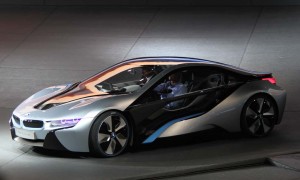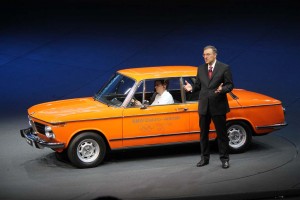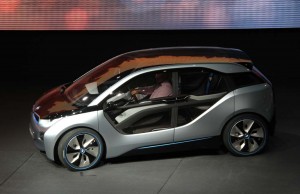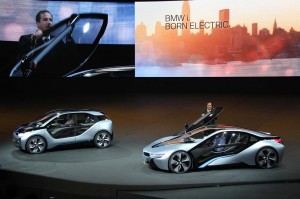Nearly 40 years after it built its first battery car – a one-off that paced the marathon during the 1972 Munich Olympics – BMW is charging back into the world of electrification. But this time it hopes to make a serious business case with its new brand-within-a-brand, dubbed BMW i.
The first of the maker’s new models are getting their initial public preview at the Frankfurt Motor Show this week with sales of the i3 city car set to begin in 2013. The second model, the larger and more sporty i8, will launch a year later, according to BMW officials.
“If the planet is to survive we must be more careful with our resources,” declared CEO Norbert Reithofer, who added that it “is technically feasible” today to produce competitive battery cars and plug-in hybrids.
Initially developed under BMW’s MegaCity program, the i3 is aimed at motorists in crowded urban areas that need a vehicle that is nimble as well as efficient. It will use lithium-ion battery technology to deliver just short of 100 miles range per charge. Its electric motor driveline will produce 125 kilowatts, or roughly 170 horsepower, through the rear wheels. BMW expects 0 to 60 times of less than 8 seconds.
A high-speed charger, it noted, would yield an 80% battery charge in under one hour – though analysts anticipate it would be closer to four hours using a home 220-Volt system.
Despite its diminutive size, the vehicle will fit four with a reasonably large, 200-liter trunk capacity, the maker noted. Weight will come in at a light 2,750 pounds thanks to the use of what BMW describes as its new LifeDrive architecture, based on the use of advanced composites.
BMW has been investing heavily in the development of carbon-reinforced plastics, or CRP, said tech chief Klaus Draeger, in an effort to resolve some critical problems — notably weight — with electric cars.
“It has allowed us to solve the contradiction that battery vehicles will have to be heavier vehicles,” he said, a reference to the fact that weight is the energy of fuel efficiency and – in a battery car – range.
Using a more conventional design and traditional materials, BMW officials have noted, would add as much as 770 pounds to the weight of the i3.
The debut of the i8, meanwhile, revealed some of the other technologies BMW is turning to in an effort to maximize range and performance. The new plug-in hybrid i8 features new laser light headlamps, a world’s first. The technology uses only about half the energy of the latest LED lamps – themselves nearly 90% more efficient than traditional incandescent headlights.
As TheDetroitBureau.com reported last month, BMW is moving to rapidly expanding the line-up of its battery car brand and sources say two more models, the i4 and i5, are under development and could be launched in the latter half of the decade.




